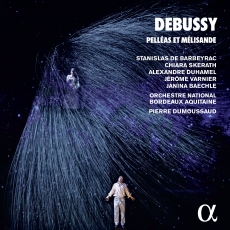Pierre Dumoussaud - Debussy: Pelléas et Mélisande - Pizzicato
Der Lockdown führte zur Absage der Aufführungen von Debussys Pelléas et Mélisande an der Opéra National de Bordeaux. Da das französische Kulturministerium den Künstlern die Möglichkeit gegeben hatte, ihre Arbeit ohne Publikum fortzusetzen, trat das Opernhaus an das Label Alpha Classics heran, um Debussys Oper aufzunehmen und so zumindest einen Teil der Produktion zu retten und sogar zu verewigen.
Die Aufführung überzeugt durch ihren ehrlichen und offenen Charakter und durch ihre Authentizität. Pierre Dumoussaud nähert sich Debussys Oper mit einem ausgeprägten Sinn für das Drama. Die Seelenzustände der Figuren zu vermitteln überlässt er den Sängern, das Orchester nutzt er, um die Handlung mit voller Spannung und ausdrucksstarkem Drama zu untermalen. Die geheimnisvolle, oft von Angst geprägte Atmosphäre wird mit großer Dynamik und kräftigen Farben besonders gut wiedergegeben, und zwar ohne den Aspekt der Mystik, der manchmal ohne Grund hinzugefügt wird.
Mit Chiara Skerath und Stanislas de Barbeyrac hat Dumoussaud ein Paar, das mit guten Stimmen die Figuren belebt. Die schweizerisch-belgische Sopranistin Chiara Skerath zeichnet die Mélisande mit viel Emotion. Mit einem leuchtenden und samtigen Sopran hat sie stimmlich alles, um diese Mélisande unvergesslich zu machen.
Für den Pelléas wurde in dieser Produktion ein Tenor verpflichtet (während die Rolle ja meistens, wie von Debussy gedacht, mit einer hohen Baritonstimme besetzt wird). Stanislas de Barbeyrac hat mit der Rolle keine Schwierigkeiten. Er singt mit einer großen Natürlichkeit, viel Raffinement und feinen Nuancen. Eine großartige Leistung!
Der französische Bariton Alexandre Duhamel ist ein phänomenaler Golaud, der seine ganzen Probleme und seine Eifersucht glaubwürdig in den Gesang einbindet. Die anderen Rollen sind ausnahmslos zufriedenstellend besetzt. Ein sehr großes Plus ist die Textverständlichkeit bei allen Sängern.
Die Tonaufnahme ist gut ausbalanciert, die Stimmen sind klar vor dem transparenten und räumlich gut aufgeteilten Orchester platziert. Und all das zusammen macht diese Produktion zu einer Pelléas-Interpretation, die auf Anhieb einen Platz im Spitzenangebot einnimmt. Es ist eine der spannendsten und leidenschaftlichsten Aufnahmen, die ich kenne. Und sie bestätigt eigentlich meinen Eindruck, dass ein Tenor für den Pelléas doch vielleicht die bessere Stimmlage hat als der Bariton. Haefliger (unter Karajan I) und Gedda (unter Kubelik) hatten das schon beeindruckend gezeigt. Barbeyrac scheint mir am Ende aber der beste Tenor-Interpret in dieser Rolle zu sein.
The lockdown led to the cancellation of performances of Debussy’s Pelléas et Mélisande at the Opéra National de Bordeaux. Since the French Ministry of Culture had given the artists the opportunity to continue their work without an audience, the opera house approached the Alpha Classics label to record Debussy’s opera, thus saving and even immortalizing at least part of the production. The performance is convincing for its honest and open character and for its authenticity. Pierre Dumoussaud approaches Debussy’s opera with a keen sense of drama. He leaves it to the singers to convey the characters’ states of mind, using the orchestra to render the action with full tension and expressive drama. The mysterious atmosphere, often marked by fear, is particularly well rendered with great dynamism and strong colors, and without the aspect of mysticism that is sometimes added without reason. With Chiara Skerath and Stanislas de Barbeyrac, Dumoussaud has a couple that enlivens the characters with good voices. The Swiss-Belgian soprano Chiara Skerath sings Mélisande with much emotion. With a luminous and velvety soprano, she has vocally everything to make this Mélisande unforgettable.
A tenor was engaged for Pelléas in this production (whereas, after all, the role is usually cast with a (high) baritone voice, as Debussy intended). Stanislas de Barbeyrac has no difficulties with the role. He sings with a great naturalness, much refinement and fine nuances. A great performance!
French baritone Alexandre Duhamel is a phenomenal Golaud, believably incorporating all his problems and jealousy into the singing. The other roles are satisfactorily cast without exception. A very big plus is the intelligibility of the text among all the singers. The sound recording is well balanced, the voices are clearly placed in front of the transparent and well balanced orchestral sound. And all of this together makes this production a top notch Pelléas interpretation. It is one of the most exciting and passionate recordings I know. And it actually confirms my impression that a tenor may be a better voice for Pelléas than a baritone. Haefliger (under Karajan I) and Gedda (under Kubelik) had already shown this impressively. In the end, however, Barbeyrac seems to me to be the best tenor interpreter in this role.

